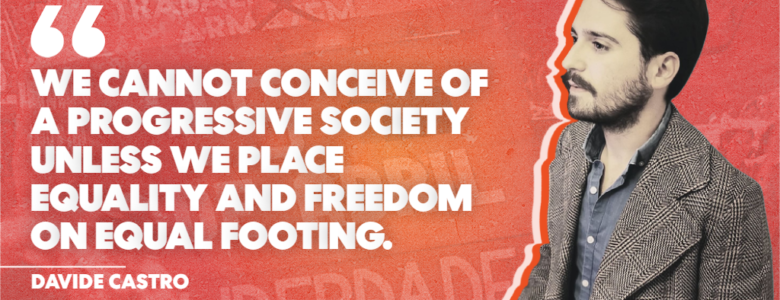
Carnation Revolution: A reminder of how far Portugal and Europe have drifted
Freedom Day no longer embodies what it once stood for, it instead provides a stark warning of democracy’s waning values across the continent, writes Davide Castro.
April 25, 1974, the Carnation Revolution – a date in Portugal where we all take to the streets to celebrate something we no longer have: democracy. How I wish we’d celebrate victories instead of losses. Now it just feels like a distant memory, one that we cherish out of nostalgia for times gone by, including by those who never experienced the transition from dictatorship to democracy.
Our democracy has been disfigured by design. By a system and leaders who needed it in order to obtain power.
But this isn’t exclusive to Portugal. One need only look at the current political situation in Europe to realise that every transition there ever was has been usurped in the name of profit, at the expense of people everywhere.
Yet some insist we’ve never had it better, despite the fact that the far-right has become the third largest political force in Portugal; just as it is in a coalition government in Austria and in Italy; it has risen to power in countries like Brazil, and it ran close to ruling over a country like France. The examples are numerous.
But has this happened by accident, by pure coincidence, or can we explain it through cause and effect? A system of old, archaic and bold for all the wrong reasons, replaced by a dream that never materialised into what it represented.
The emotion and drive of the time were undoubtedly real but we fell for a dream of a better world instead of actually constructing it. And in this new world, a fake world, dominated by forces conspiring against the many, we need no conspiracy theories to explain to us our predicament. It is the very real conspiracies which we must not ignore.
It’s as if we’re stuck in a dream-like-state that we cannot get out of. Because societies built on an unhealthy level of individualism are inhumane societies that don’t take into account the essence of what it means to be human. And this is something that concerns us all, especially those most deprived. Those for whom this system isn’t like living in a dream-like-state, but a nightmare.
We live in a system that tells us to not look up, so that we don’t question those in power, where we’re actively encouraged to strive to become them [the 1%], if only we work hard enough. In doing so, we fail to look down; to acknowledge the existence of others for whom the idea of looking up is simply a ridiculous thought that doesn’t reflect reality. And here lies the struggle: to break away from this dream-like-state so that we remain conscious of class struggle.
Once the bastions of freedom and emancipation, the Left has sadly succumbed to a new form of totalitarianism. One that puts equality over freedom. But we cannot conceive of a progressive society unless we place them on equal footing. Because equality without freedom is simply dictatorship.
If we strive for social equality, we must also strive for economic equality. The enormous failure since the onset of financialised capitalism has been to accept the former and neglect the latter. So we shouldn’t be surprised by the far-right’s rise over the last decades. After all, we’ve been governed by centrist and so-called Left parties, which have been all too happy to manage the system instead of transforming it. Under a system that alienates individuals, that negates possibilities of free exchange, that stifles public spaces, the political situation will only deteriorate.
In 2004, Portuguese Nobel Laureaute, José Saramago wrote that we must question the existing system of ‘democracy’ at every opportunity and added that, if we didn’t, we’d not only lose it forever but also any hope of seeing human rights respected on earth some day.
Fast forward to 2022 and not only have we lost democracy to a system of oligarchy, but we’re seeing human rights trampled on everywhere. And yet, the majority of us still refer to this system as ‘democracy’. Even when the democracy in which we live has been kidnapped, conditioned and amputated. In this system, the power of the citizen in the political sphere is constrained to removing a government that we don’t like and replacing it by another one that we might come to like better.
But the important decisions are made in another sphere. By oligarchs who don’t care about you and I. So, as we acknowledge the alienation of the system that we’ve allowed to consume us, let us begin thinking of ways through which we can fight back. With the far-right rising everywhere, with Establishment leaders’ policies fuelling that rise, the only answer is organisation. Lest we allow the far-right to gain power and repeat the horrors of decades gone by.
Instead of celebrating April 25 out of nostalgia for what it represented, let us fight to break the shackles to which we’ve become accustomed. To get us out of this dream-like-state and achieve a truly free and equal world. We haven’t got much time.
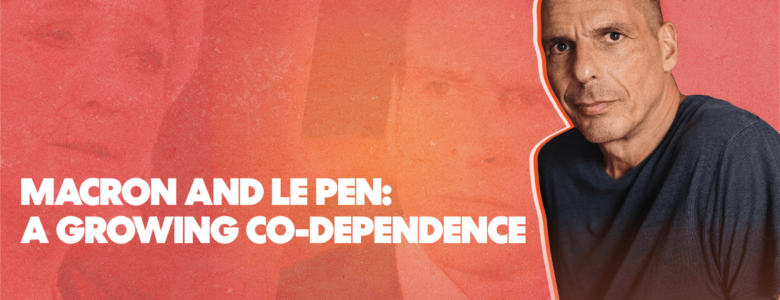
Macron and Le Pen: A growing co-dependence
The comfortable re-election of French president Emmanuel Macron against an opponent with whom he shares a mutual dislike almost obscures a certain co-dependence between their political camps.
Emmanuel Macron and Marine Le Pen may loathe each other but they have developed a type of political symbiosis that provides crucial insights into the current predicament in France, Europe, and beyond.
The spectre of a Le Pen victory seems to be establishing a fine tradition in helping incumbents return to the Elysée. Before Macron, 20 years ago, it had helped Jacques Chirac unite 82 percent of the electorate against Marine Le Pen’s father, Jean-Marie Le Pen.
But this time is different. In 2002, it was a one-way street: fear of Le Pen forged Chirac’s triumph. In 2022, it was more of a two-way street: Le Pen helped Macron assemble a clear majority of voters while Macron bolstered Le Pen – allowing the ultra-rightist to score a share of the vote that would have, once, caused progressives to hang our heads in shame. Over the past five years, the Macron-Le Pen co-dependence grew not in spite of the two opponents’ mutual antipathy but, at least partly, because of it.
Chirac’s 2002 re-election was built on a coalition of the right, the centre, and the left against the xenophobic ultra-right. Five years ago, faced once more with the same ultra-right threat, Macron broke the mould by presenting himself as neither-left-nor-right. It worked, only too well. Evidence of the success of Macron’s neither-left-nor-right mantra is that it has infected the thinking of those within the electorate who oppose him most fiercely.
The young, the precariat, and, increasingly, the more insecure segments of the proletariat, refuse to assess presidential candidates in terms of the left-right divide. They see a France ruled by an alien world of money which has not just left them behind but is, in fact, holding them there. In their eyes, Macron embodies that world. For them, the new political divide is between respectable politicians promising to maintain this world and mavericks promising to demolish it.
In the pre-election televised debate between the two candidates, Macron succeeded in presenting himself as the epitome of the efficient, competent administrator who understood the system and could manage it better. But that does not impress voters who want the system blown up, not better managed.
Macron’s approach reminded me of the hardcore Remainers in Britain who failed to foresee the blitz mentality of Brexit-leaning voters: the more they were told, with charts and statistics, that Brexit would cause them to suffer, the more excited they became about the prospect of making collective sacrifices in order to tear down a system that they believed was rigged against them.
Returning to the comparison with the 2002 election, there is a great difference between the cross-spectrum coalition that backed Chirac with Macron’s radical neither-left-nor-right mantra. Twenty years ago, leftist voters supported a right-wing politician to keep Le Pen out. Chirac understood that their vote was borrowed from established political forces like the Socialist Party and the Communist Party, and he governed as if on the basis of an implicit contract with fierce critics of the establishment. In contrast, Macron succeeded in eliminating the parties of the left and the right before invoking the spectre of Le Pen to dominate fully.
Once in the Elysée, and with an absolute majority in the National Assembly, Macron proceeded to pursue his agenda free of the commitments that had anchored Chirac, constrained only by the strictures of Big Finance and an austerian European Union beholden to business interests. Within a few years, he succeeded in making Paris more business-friendly, revitalising the French start-up scene and making a dent in the official unemployment rate.
But the precariat expanded. Many voters saw their prospects diminish as a direct consequence of policies which seemed to them to constitute an outright class war waged against them personally: tax giveaways to the already ultra-rich, deregulation of layoffs, a regressive carbon tax, and a determination to raise the pension age significantly in a country where poor men’s life expectancy is 13 years lower than that of well-off men.
This reality became the foundation of the mutually reinforcing feedback loop between Macron’s and Le Pen’s political oeuvre. While there is no whiff of collusion – they are clearly allergic to each other – the dynamic between them forms a political cul-de-sac that facilitates a new type of capital accumulation that has produced a new ruling class which Macron ultimately serves and whose reign is strengthened when someone like Le Pen is the official opposition.
None of the above should be interpreted as a reluctance to take sides. Five years ago, I called on anyone who would listen to vote for Macron against Le Pen. All I needed was the thought of the utter terror in the hearts and minds of my French friends, especially those with browner skin, at the prospect of Le Pen getting her hands on the police and the interior ministry.
This year, even though DiEM25 (the movement to which I belong) decided to issue the same recommendation to our French members, it proved a harder ask. The Macron-Le Pen feedback effect has narrowed the space that used to separate them on matters of human rights and basic dignity. How can we forget Gérald Darmanin, Macron’s interior minister, who last year denounced Le Pen for being “too soft on immigration”?
Macron-style politicians are failing everywhere to stand up for the liberal rationalism they champion. Hiding behind their neither-left-nor-right narrative, they supported the irrational combination of austerity and bank bailouts that delivered 12 years of stagnation, preventing serious investment in green energy. During the pandemic, they bowed to pointless violations of civil rights. Today, they demonise moderates who warn against escalating the NATO-Russia conflict and who support a deal between the US and Russia that allows a neutral Ukraine to enter the EU but keep it out of NATO.
The moral of Macron’s re-election is that, in class-ridden societies, the left-right division remains essential. When centrist politicians succeed in obscuring it, they get caught in a dynamic feedback loop with the ultra-right that makes them sound shriller and more irrational, while making the ultra-right seem deceptively more palatable. Even when they win, they lose.
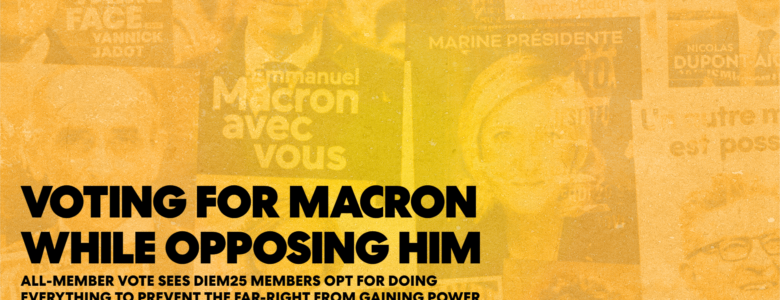
DiEM25 critically backs Macron against Le Pen in French election second round
An all-member vote on the run-in between Macron and Le Pen sees DiEM25 members opt for doing everything to prevent the far-right from gaining power
[Lisez ce communiqué en français ici]Following an all-member vote regarding the second round of the French presidential elections, DiEM25 supports Emmanuel Macron over Marine Le Pen, while remaining vehemently opposed to the current French leader and his policies.
Five years have passed and, once again, the people of France are faced with an all-too-familiar scenario, as they are left to choose between the far-right rhetoric of Le Pen and the establishment politics of Macron.
Some had been lured by Macron’s freshness last time around, believing that his ambitions of European integration would bear some progressive fruit. Soon after his election, however, it became clear that his promises were nothing but a communication tool.
The French president’s failed promises, neoliberal economics and anti-social policies means there are now no illusions that Macron will substantially represent any sort of progressivism. However, that does not warrant the election of an authoritarian, racist leader instead.
Voting for Macron while opposing him
Last time Le Pen and Macron faced each other in the second round of the French presidential elections, members of DiEM25’s Coordinating Collective had cautiously but determinedly urged progressives in France to vote for Macron to keep Le Pen from office, only to campaign against him the very next day of the election.
And that is now the same position DiEM25 members find themselves in, preferring to support Macron against Le Pen, but continue to oppose him and his policies.
Same stance as 2017
It is a similar position that we held in the 2017 elections, insisting on the fact that ‘backing’ Macron does not mean we are agreeing with his policies.
DiEM25 co-founder Yanis Varoufakis penned a column for Le Monde five years ago, stating that defeating Le Pen is the main priority while still remaining vigilant against Macron’s real political agenda.
“I shall mobilise fully to help you beat Le Pen with the same strength that I shall be joining the next Nuit Debout to oppose your government when, and if, you, as President, attempt to continue with your dead-end, already-failed neoliberalism.”
The current state of affairs in France is anything but encouraging, yet keeping out a candidate that is directly opposed to what we stand for in favour of the lesser of two evils is something that we can agree on, for now.
Breaking the mould
As Europe and the world is continuously presented with such dilemmas, and having seen the Le Pen-like policies adopted by Macron’s government on immigration and the brutal suppression of demonstrators in his current term, we are all too aware that those who claim to protect society from authoritarianism are becoming increasingly like those they pretend to oppose. Never before has DiEM25 been more necessary, and we urge progressives in France to join us in building a left-wing movement that is as transnational as Macron’s neoliberal Establishment and Le Pen’s populist xenophobia. Only then can they be defeated.
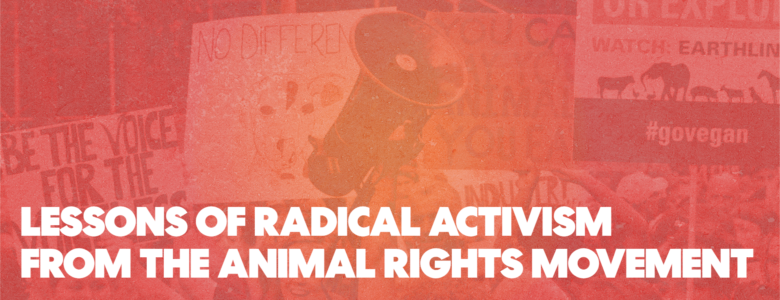
Lessons of radical activism from the animal rights movement
Dusan Pajovic takes a look at some of the methods used by the animal rights movement and whether they could be applied to other activist causes
The Animal Rights (AR) movement is one of the fastest growing social justice movements in history. There are now a number of groups that radically challenge the system of exploiting animals. The question is: what is the AR movement doing that makes it so successful?
I’ve spent countless hours participating in protests, outreach and education programmes, writing petitions and law proposals, as well as protesting in front of slaughterhouse facilities. After years of playing an active role in this movement, here are some of the key lessons that class struggle organisations or any other racial/gender justice groups can take and learn from the advocates of animal liberation.
For the purpose of this article, I’ve categorised these tactics into five different pillars.
1. Community work
is key if you want your activism to be intersectional. These types of activities not only position your organisation as working-class friendly, but also keep you in touch with the people who are struggling and who your comrades are in the fight against the establishment. During the process, you will even help them in the most direct way. People tend to be fed up with their daily lives and problems and don’t really have the energy to talk or think about Hegelian perspectives. More often than not, they need a kind act and a nice word, someone to fight alongside. Animal Save Movement recognised this with their Mutual Aid actions, where they give plant-based food to those in need, together with a leaflet that promotes their ideas and why it is important to be vegan. Food Not Bombs does something similar. It’s in human psychology that when someone receives something, they want to give something in return. That may lead to an attitude change. I am not saying you should abuse this or patronise people, but if you are talking about class/gender/racial inequality or environmentalism and animal rights, you are doing a good thing and changing the individual in the process. An additional layer is being in touch with the people and animals that we are fighting with and for. It’s easy to get lost in theoretical principles and education that is far away from events on the ground, so it is important to constantly remind ourselves why we are doing this.
2. Street education with performativity
Have you ever seen some people hold (fake) dead animals in your city? Or have you seen someone with an Anonymous mask holding a laptop with a sign that reads “truth”? Then you have been exposed to the actions of animal liberation advocates! And I bet you couldn’t just look away. If you haven’t come across this, let me break it down to you. Many organisations, including PETA and Direct Action Everywhere (DxE) hold ‘dead’ animals to portray the state that they continuously endure in slaughterhouses, fur or egg farms. This kind of emotional shock often leads people to getting informed and possibly to stop funding these industries. Activists would then be there to provide more info and flyers. A bit less shocking but equally effective actions are done by Anonymous for the Voiceless (AV). AV holds famous Cube of Truths, where activists stand in cube-like shapes in the streets with anonymous masks while holding their laptops and tablets that portray videos of animal cruelty that happens on regular basis in this industry. But this is just bait for a conversation. Once you come closer to look at videos, someone called the “outreacher” will approach you and start asking questions. No, they won’t just preach to you why veganism is a moral way of living. Rather, they are going to engage in a Socratic method of conversation that has proven to be effective in changing attitudes. The key part of this method is to lead the person to come to a conclusion themselves, by embracing logic with tactually developed questions, in this case on why they aren’t vegan yet. Of course, during the process, you would also get some information on what is happening inside the animal agriculture industry, but you would be the one that speaks the most and answers the questions.
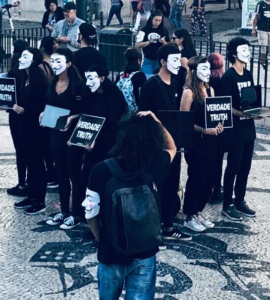
3. Pressure campaigns and targeting
Even though this tactic is not highly popular, it is extremely effective, and it has been used by some AR organisations that have inflicted a massive damage to animal abusers. For example, Stop Huntingdon Animal Cruelty (SHAC) was an international animal rights campaign seeking to shut down Huntingdon Life Sciences (HLS), Europe’s largest contract animal-testing laboratory. The activists were pressuring primary, secondary and tertiary figures. First they were emailing and phone calling the abusers and the company itself, followed by showing up in front of the houses of those abusers with megaphones and whistles, disrupting their daily activities. Then the campaign was expanding to secondary and tertiary targets; including the shareholders, suppliers and banks by carrying out the same actions mentioned above. All of them would be provided with the footage of what is happening in HLS, along with the info on why it is unethical and unscientific. To demonstrate the power of this tactic, let me quote an article on this matter:
“SHAC also turned its attention to other companies and investors that had a connection with HLS. Many, including the embarrassed Labour Party (which held shares in HLS through its pension fund), moved their money out to avoid further harassment. Institutional investors, including Shroeders, also withdrew. Not surprisingly, the value of the company plummeted: being valued at £360 million in 1990, its market valuation fell to £5 million in 2001. HLS was also dropped from the New York Stock Exchange. When protests directed at its bankers, the Royal Bank of Scotland, led to its account being closed, the Bank of England—at the request of the British government—was obliged to step in and provide banking facilities. This was an unprecedented step.”

DIRECT ACTION EVERYWHERE/COURTESY
4. Constructive civil disobedience and direct actions
The aforementioned DxE have gained so much publicity and support for their bold and radical actions. To name a few, they regularly chain themselves inside of slaughterhouses to stop them from operating (similar actions are being done by Meat the victims). They also protest at major fast food chains such as McDonalds with loud noises and graphic images of animals being killed, and they do sit-ins at strategically important places to raise concern about Rose’s law. Additionally, unlike the Animal Liberation Front, which rescues animals with their masks on (see below), DxE engages in open rescue, as a statement that the right to rescue animals from being killed is a moral act, even though it is illegal. “One has moral responsibilities to disobey unjust laws,” Martin Luther King Jr. once said. Open rescues are seen by millions and force the issue of animal rights into the public consciousness. DxE activists are now going to court for rescues at some of the largest factory farms in the world.
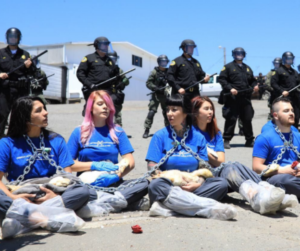
5. Economic sabotage
Now we come to the most controversial way of carrying out activism, which we will analyse through one of the groups with the greatest legacy – the Animal Liberation Front (ALF). ALF is a bit like Antifa – it’s rather a movement than an organisation, and everyone is welcome to identify as a member if they follow their basic principles: non-violent direct action in protest against incidents of animal cruelty. ALF is most famous for their raids of animal testing labs. During the raid, they would rescue the animals and take the footage filmed by researchers and, in some cases, equipment was destroyed. Due to those actions, ALF has shut down many companies that simply couldn’t recuperate after the economic sabotage that they were inflicted with. The same goes for slaughterhouses and fur farms. The fact that the ALF was ranked No.1 on the FBI’s list of domestic terrorism threats in the USA speaks volumes. The leaderless movement that operates in small cells, that never hurt a living being was above white-supremacists. It seems like profit loss hurts the FBI more than lives lost. Surprise, surprise.
As one member of the ALF said: “If we are trespassing, so were the American soldiers who broke down the gates of Hitler’s death camps; if we are thieves, so were the members of Underground Railroad who freed the slaves of the South; and if we are vandals, so were those who destroyed forever the gas chambers of Buchenwald and Auschwitz.”
I am not saying we should just directly implement everything written here, but we need to elaborate on these matters and analyse what is effective and what isn’t, and what succeeded and what didn’t. Before going into activism ourselves, there is a tonne of strategic planning that has been already done, both within and outside of our movement. We need to make use of it. Act smart and be on the right side of history.
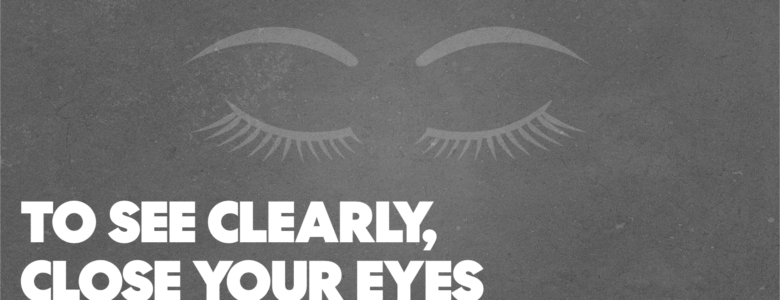
To see clearly, close your eyes
It’s easy to get caught up in the endless horrific images from the war in Ukraine, yet focusing on tangible action is far more effective than falling into the Establishment’s emotional trap, writes Mehran Khalili
For weeks, social media has provided a stream of brutal images from Ukraine. Grainy, handheld scenes of executions, torture and mangled bodies dominate every browser tab, originating from witnesses on the ground. ‘Warning, this is graphic,’ the platforms advise you solemnly, knowing you’ll click.
I follow the conflict closely, but I’m trying to avoid looking at these images. And you should consider doing the same. Why?
Whatever you see, it won’t change your activist objectives
If you’re reading this, you’re most likely an activist citizen, not a passive news consumer. That means you focus on what you can influence.
With that in mind, here are the facts of this conflict that matter today:
- Russia is the invading country. Everyone with a pulse should condemn its government for this, and especially Putin.
- War is hell, and this one’s no exception. We knew this as soon as Ukraine made clear it was rightly going to resist the invasion.
- The people of Ukraine need our support, and humanitarian aid.
- There should be a ceasefire, immediately. And Russian troops should withdraw from Ukraine.
Your options for having an impact are currently limited. You could play a role in generating support for a ceasefire, say, with an information campaign. Or you could work on humanitarian needs, like helping refugees. (I explored some other things activist citizens could do in a live debate last week, with my colleagues from DiEM25.)
Now consider the social media Stream of Brutality. There’s nothing these images could reveal that might change the facts above. Russia invaded, Ukrainians are suffering, we all need peace to break out.
So why click?
You may be being lied to
In a rush to be first, Stream of Brutality images flood social media. Legacy outlets pick them up; many go viral. Sometimes they’re horrifyingly real. And sometimes, they’re lies.
The Establishment love a good fact check, striving as they are to maintain influence by calling out ‘fake news’. So if an image supports the Establishment narrative (which is roughly “Putin = latter-day Hitler”), and their own media later say it’s fake, it’s safe to say it is. For a given image, it usually takes a few days for it to be either verified or debunked.
But on the Stream of Brutality, which flows in realtime, you can’t be sure if what you’re seeing is the truth. So why click?
… but you’re definitely being pressured
On that “Putin = Hitler” point: it’s easy to forget that here in the West, the Establishment are campaigning, too. And their target is us.
Since the beginning of the war — and long before — they’ve been trying to weaken Putin, for obvious reasons. But as the war has continued, some corners of the Establishment are building public support for the West to ‘do more’. It’s a slippery slope from there to an escalation in the conflict which, with with a nuclear power like Russia, could be disastrous.
Stream of Brutality images from social media – curated, amplified and packaged – are the raw materials of this quiet Establishment campaign.
Of course, pushing for peace would also stop the savagery that these visceral images depict. Yet the Establishment know that the average consumer of these images won’t want peace after viewing them, but revenge. I.e. escalation. I.e. a wider war.
And it’s working. Here’s The Guardian, a leading left-wing outlet, calling for what could result in World War III just days ago:
“Putin rules by fear. So frighten him back. He does not want a fight with the west, let alone a third world war – Nato’s excuse of last resort for refusing to confront him. He knows he’d lose. It scares him,” it read.
Words like “atrocities”, “public executions”, “mass rapes” and even “genocide” are on everyone’s lips, often as rationale for NATO escalation. Even some hardened campaigner friends of mine are now calling for it.
War propaganda taps into our instinctive drives. It makes us abandon reason and succumb to our emotions. And runaway emotions are the enemy of strategic thinking.
So why click?
Conclusion
Immersing yourself in images of the horrors of the Ukraine war won’t help you to campaign more effectively for peace. Quite the opposite: it will splinter your focus, rouse your emotions. And could even co-opt you into pushing for escalation. Which would be catastrophic.
Whatever you’re shown, the facts won’t change: Putin is the aggressor. The Russian government is wrong. Ukraine, the world, needs a ceasefire.
This doesn’t mean being blind to what’s actually happening. Don’t disconnect from the reality. Read verified accounts of the conflict, from the geopolitical analysis to the violence on the ground. Develop a holistic picture.
But don’t get lost in the stream. Peace is the prize. Keep your eyes on that, instead.
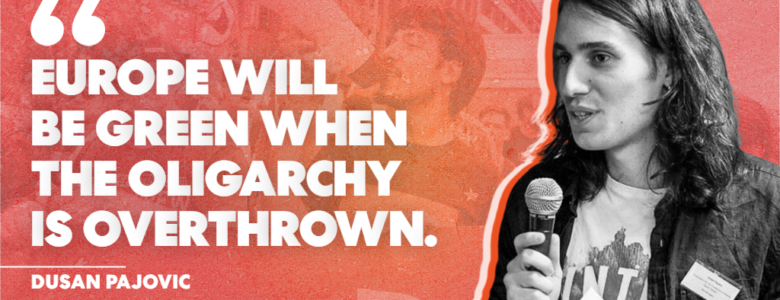
Europe will only be green when it overthrows its oligarchy
The European Commission’s ‘Green Deal’ is woefully inadequate. We need Europeans on the streets, citizens’ assemblies, workers reskilled and MeRA25 in parliaments
At the beginning of 2020, at the peak of Green New Deal discourse, the European Commission (EC) issued its own policy package: the European Green Deal.
It tried to ride the wave of GNDs, using the momentum generated by US Congresswoman Alexandria Ocasio-Cortez and the progressive pan-European movement Democracy in Europe Movement 2025 (DiEM25), to placate the masses — and silence the activists demanding a more serious approach towards the climate crisis.
In this, the EC utterly failed. The content of this ‘Green Deal’ is woefully inadequate for the challenge at hand; in speed, scale and scope, the plan fails to respect the scientific consensus about the demands of a just transition. And it leaves intact the EU’s basic economic architecture which has created the social and ecological crises we face today, one centered on growth and profit rather than people and planet.
Why the Green Deal failed
Needless to say, backroom deals between career politicians and international lobbyists will only enrich the oligarchs while oppressing the Earth and 99 percent of people.
The EC claims it wants a carbon neutral continent by 2050, while at the same time it and its member states provided more than €112 billion a year between 2014 and 2016 in subsidies to the fossil fuel industry. On the same matter, 15 of the member states subsidise fossil fuels more than renewables, while they also get more tax breaks than their green energy counterparts. It’s worth mentioning that this is not just a European trend, but a worldwide rule. G20 states have given more than €3 trillion in subsidies to fossil fuels since the Paris Agreement.

The EC claims it wants a carbon neutral continent by 2050, while at the same time it and its member states provided more than €112 billion a year between 2014 and 2016 in subsidies to the fossil fuel industry. Image: Suzanne Lawrence.
Of course, these narcissistic careerists who we call politicians aren’t just friends with the fossil fuel industry. There is also, for example, animal agriculture which is responsible for 32 percent of people-generated methane emissions. And yet no one’s talking about ending this unethical and destructive sector of production. And that’s before we even consider the effect that the military has on the environment.
What needs to be done
The fact is that we have clear data on what needs to be done and how to do it, what practices we should continue and what should be ended. DiEM25 wrote a detailed blueprint for this transition, where we went into details of every step that needs to be done. We have even named these institutions that need to operate within planetary boundaries.
Bill McKibben, the founder of 350.org, said that “this is the first attempt at a political solution to climate change that is on the same scale as the crisis itself” while James K. Galbraith described our policy as “the most comprehensive program in Europe for the historic challenge ahead”. Now politicians have to implement this policy package. But can we really trust this rotten structure to do something good? I don’t think so. The ties of corruption are too deep. We need a new structure.
Decarbonising Europe must be a top priority. Otherwise, a rising temperature of 2.7 degrees will become a reality. When that happens we are going to witness a lot of climate disasters, rising sea levels, a wave of climate refugees and more.
But for the green transition to work it must be fair for workers. Those workers left without a job will be compensated through universal basic income and will be taken care of through the program of green jobs training. For example, coal miners will be able to move to a publicly owned wind industry and learn how to work in that area.
For the green transition to work it must be fair for workers.
My point is clear: Europe will be green, but only once its oligarchy is overthrown.
In order to do that we need people on the streets, citizens’ assemblies around the continent, scientists being listened to and MeRA25 (DiEM25’s electoral wing) in parliaments across Europe.
This way, we will tackle all the overlapping crises simultaneously: environmental, economic and the crises of democracy. Our agenda is composed of three major initiatives:
- Green Public Works: an investment body to kickstart Europe’s equitable green transition
- Environmental Union: a regulatory and legal framework to ensure that the European economy transitions quickly and fairly, without transferring carbon costs onto front-line communities
- Environmental Justice Commission: an independent body to research and investigate new standards of ‘environmental justice’ across Europe and among the multinationals operating outside its borders.
At least five percent of the European Union’s GDP must be funneled into green transition yearly, while we take a thoughtful consideration of international, intersectional and intergenerational justice. Of course, planetary boundaries and attention towards all sentient beings must be taken seriously into account during the process, and afterwards.
The EC’s Green Deal does not care about democratisation. The EC talks about vague allocation of resources through private investors, while it simultaneously plunders the Global South. If we want to do this right, international, intergenerational and intersectional justice must be a precedent.
Europe must lead the way, due to historical and current injustices (such as colonial and neo-colonial practices), but also due to the greater responsibility for historical and current emissions, and greater technological and financial capacity.
No one says it is going to be easy but it must be done. The pathway to the just transition is clear:
- Universal Basic Income in a form of a dividend for all citizens
- Job guarantees and workplace democratisation
- A 4-day work week with fair wages
- Training programs for green jobs
- A roof over every citizen’s head through repurposing vacant houses
- A carbon tax on all polluters
- Keeping fossil fuels in the ground
- Ending animal agriculture
- Free public transport and regional railways with electric trains all over the continent
- A law of Ecocide
- A commitment to have a carbon neutral continent by 2030
We need to start now. Join DiEM25 and help us make this a reality.
This article was originally posted on GND Media, and has been re-published with permission.
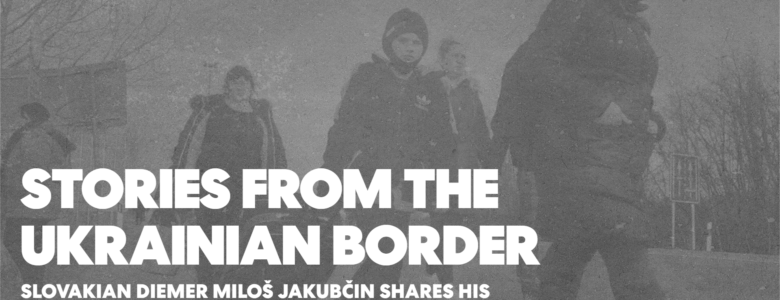
Stories from the Ukrainian border
Slovakian volunteer and DiEM25 member Miloš Jakubčin shares his personal stories from the Ukrainian border.
Escaping a war zone is a journey that no person should have to make in their lifetime, yet that is the reality facing countless Ukrainians amid this ongoing conflict.
Miloš Jakubčin, a volunteer in Slovakia and a DiEM25 member, recounts some of the personal stories he has been a first-hand witness to in recent weeks.
From the beginning of the day, an uphill struggle ensues to assist with the various families looking to find refuge.
Four of us leave from Košice, Slovakia, at 04:00 in the morning, I take two Ukrainian friends, and the shift in Ubli starts at 06:00. We come to a hall full of beds with sleeping children. There is silence, peace everywhere. We look around, we get improvised training lasting a few minutes.
At around 07:00, the first buses arrive from the border. I hand my luggage to five women heading to Prague and, for the first time in years, I dust off my broken Russian. The day is slowly starting.
The lady gives me 300 Czech crowns and asks me to top up her phone credit. The mother of a little girl with abdominal pain is looking for a doctor. In a tent, tonnes of family suitcases are already waiting to be transferred. Potential transport must be called for the lady who is shaking on what is a chilly morning, with a small baby and a large dog.
A lady with bloodshot eyes emerges from another van, followed by two small children. The fire chief whispers to me: “This lady needs a psychologist.” We take the lady with the children away and look for a psychologist who hasn’t yet arrived. A chaplain has offered himself, but he needs an interpreter to talk. An interpreter is being sought.
A young boy turned 11 years old the day before. His view is already more mature than most people in their thirties in Slovakia. A teddy bear from a commercial airline as a gift is just a small consolation. At the very least, they managed to get transit to Krakow.
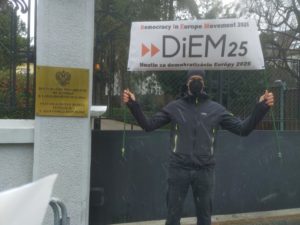
DiEM25 members protest outside the Russian embassy in Bratislava
Even from one volunteer’s first-hand experience, it becomes evident that those seeking refugee come from all walks of life.
A distraught old lady sobs in her fur coat. With a daughter, niece and four children, they need to be accommodated for a few hours, and so we begin to look for beds.
A father and seven Roma children are looking for refuge – they don’t care where they go, and we will convince the bus driver to go to Kosice.
A couple with Egyptian roots are keen to go Bratislava, but we will offer them accommodation in Nitra. They can’t stop thanking us as they depart.
A lady speaking in broken Czech is trying to provide temporary shelter for nine members of her family sitting in cars nearby.
I hear that some boys from Prešov and Snina are looking for a chair for a disabled person – a young girl with prosthesis up to her hips soon sits with us.
Two teenage girls do not have transport to Brno, they check in at the booth near the Czechs, their friend says something on the phone in Ukrainian, but not a word can be understood amongst the noise.
Six drivers are chaotically offering to pick up passengers, but everyone needs to be checked and double-checked so that refugees are not kidnapped or sold.
I am admiringly watching my Ukrainian friends how they translate their people’s problems for hours and are actively helping to solve them without a break.
Thirteen people in three cars ask for accommodation, they manage to find it at the parish in Snina, through a local charity.
There is a lack of volunteers in this crisis, and Miloš mentions that, by 15:00, it is time to train those taking on the next shift.
We say goodbye and get in the car. We agree that it was not such a difficult day because, in the previous days, there were even more refugees. My shoulders hurt, as are my frozen knees but my back hurts the most. I drive to Košice on autopilot. Throughout the journey, we curse the absence of coordination from the state forces which weakens the effectiveness of the volunteer groups.
We organise the first train to Prague. Some fifty people are pushing for a guide at the last minute, we run to help others with their luggage to make it… One family is no longer lucky and unfortunately the train is literally leaving from under their noses.
A depressed pensioner contacts us with a request that she wants to go to Prague. However, she insists on going by bus, because she tends to feel sick on the train. She has no money and since the buses are not free, she is eventually forced to join the train connection with a transfer through Žilina.
This is just some of what Miloš encountered as a volunteer. He mentions that the majority of people he witnessed were impoverished old women, unhappy mothers and crying children, who thanked Slovaks for their help.
It is a crisis that could do with more hands to help out those in need, as opposed to the war of words that is taking place across the media spectrum.
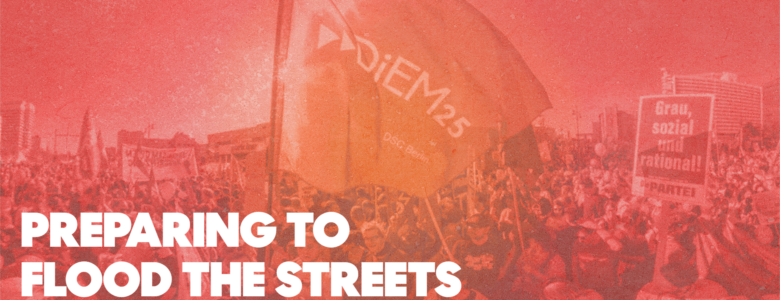
Preparing to flood the streets
DiEM25 is preparing to have more of an active presence on the streets through numerous campaigns and initiatives, but we need you to join our cause.
Yes, we have good policies. And yes, we have our MeRA25s. But no, DiEM25 is neither a think-tank, nor just another political party. Above all, we are a bold grassroots movement.
Therefore, we are looking to, as we usually do, put our money where our mouths are. Our organisation is going to be more and more present on the streets, in various actions such as civil disobedience, leafleting, pressure campaigns and many more ways in which we can challenge the oligarchy.
We can’t do this alone, however. We need your involvement. We want like-minded people to join us on the ground and to help us build this narrative accordingly.
Whether you are interested in getting involved by yourself, with your Local Collective on the ground or through brainstorming with our campaigning coordination team – there are multiple ways for you to participate.
As a first step, join DiEM25 if you’re not yet a member. Then, please fill out this short form to facilitate organising our teams and volunteers.
Also, join our monthly campaigning calls every fourth Wednesday of the month in order to learn more and get organized! Our next call will be on Wednesday, April 27 at 19:00 CET.
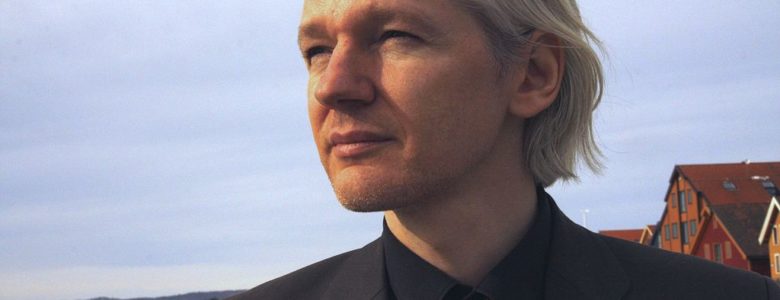
Julian Assange has been imprisoned in British Guantanamo for three years. It’s a crime against us all
Today is another landmark in one of the worst miscarriages of justice ever perpetrated by our so-called democracies in the West: Julian Assange has now been in a jail cell at Belmarsh prison in London for three years.
The UK and US governments rightly express outrage over reports of war crimes in Ukraine. Yet while doing so, they make an example of Assange for revealing, with definitive proof, their own war crimes. While the media decries the spread of disinformation and attacks against journalists, most stay silent as an actual journalist slowly dying in prison for doing his duty of informing the public.
Assange faces up to 175 years in an American prison. So unless UK Home Secretary Priti Patel stops his extradition to the US by May 18, we’ll likely be marking this date for decades to come. If you value democracy and freedom of speech, we urge you once again to pressure the UK government to stop this travesty of justice and save Julian’s life. Never has our voice been more needed than now.